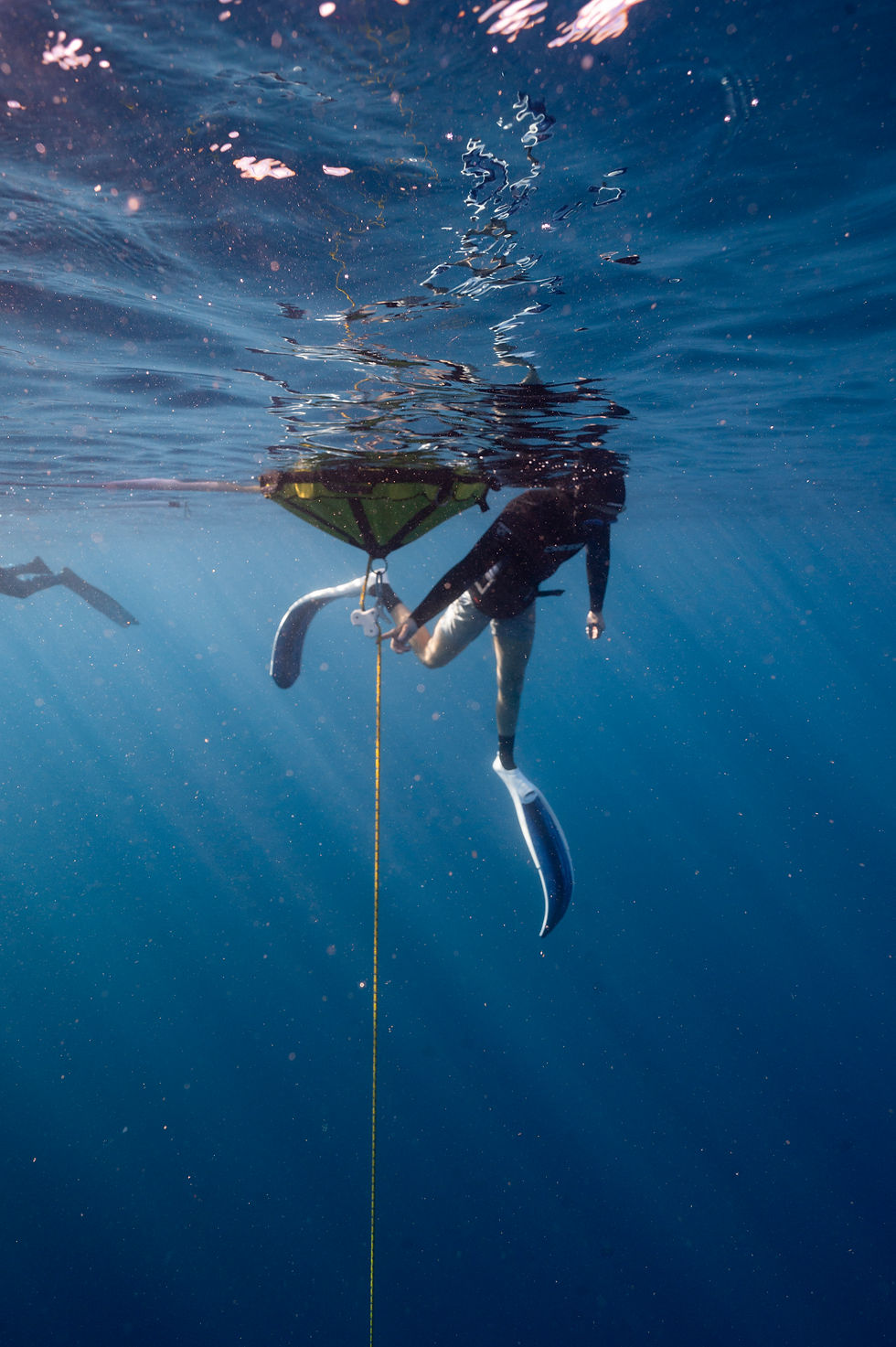Is Freediving Dangerous? Separating Myth From Reality
- Curtis Tredway

- Dec 1, 2024
- 4 min read

"You’re crazy!"
"Holding your breath that long can’t be good for you!"
"Aren’t you scared of blacking out?"
These are some of the most common remarks I hear as a freediver. Whether it’s strangers at the pool, friends, family, or former colleagues from my old office job, their concerns always stem from a lack of understanding about what freediving truly entails.
As a Freediving Instructor, let me demystify these fears and misconceptions. Freediving, when practiced properly, is one of the safest sports you can do, regardless of your age.
The Real Risks of Freediving
Let’s be honest: like any activity, freediving comes with risks. However, the level of risk you take on is entirely within your control. Unlike high-impact sports, freediving doesn’t lead to broken bones or blunt trauma—unless, of course, you slip entering the water!
When done properly, freediving is low-impact and incredibly gentle on the body, making it suitable for all ages. This year, while training in Amed, Bali, I had the incredible honour of meeting and photographing Helen Allison, a World Record Holder at 70 years old, who began her freediving journey at the remarkable age of 62!
The key to safe freediving lies in education, preparation, and sticking to some essential rules, which I’ll cover below.
The Health Benefits of Freediving
Freediving isn’t just safe; it’s also packed with health benefits. Here are just a few scientifically supported perks:
1. Improved Lung Health
Regular breath-holding exercises increase lung capacity and elasticity. Freediving teaches you how to use your lungs efficiently, which may even help prevent or manage conditions like asthma. Research from the European Respiratory Journal has shown that breath-holding can enhance respiratory function and oxygen efficiency.
2. Lower Heart Rate and Blood Pressure
Freediving activates the Mammalian Dive Reflex, a natural mechanism designed to optimise oxygen usage while conserving energy. This reflex lowers your heart rate, reduces blood pressure, and improves circulation, particularly to vital organs.
3. Mood Booster
Freediving promotes relaxation and mindfulness. It’s like meditation underwater. Plus, exposure to water is linked to increased dopamine and serotonin production, which are natural mood boosters.
4. Improved Flexibility and Fitness
The act of diving enhances both cardiovascular and anaerobic fitness, depending on the style of diving you pursue. Stretching during breathwork sessions can also improve flexibility, particularly in the diaphragm and chest.
Understanding the Urge to Breathe
Many people assume that the urge to breathe comes from a lack of oxygen. In reality, it’s the buildup of carbon dioxide (CO2) that triggers this feeling. The Mammalian Dive Reflex allows your body to optimise oxygen utilisation, ensuring you’re using it effectively even on a long breath-hold.
This is why elite freedivers can hold their breath for over 10 minutes and trained recreational freedivers often hold for 4-5 minutes—without any long-term negative effects. It’s also important to note that breath-holding is vastly different from cutting off oxygen supply to the brain, as your body has built-in safety mechanisms.
The Truth About Blackouts
One of the biggest fears people have about freediving is shallow water blackout.
Here’s the reality: if you follow proper safety protocols, the risk is incredibly low.
Key Preventative Measures:
Surface Intervals: Allow adequate rest between dives. A common rule is to rest for three times your dive duration
Stay Hydrated and Rested: Fatigue and dehydration increase risk.
Progress Slowly: Don’t force dives or push past your limits.
Buddy Diving: Always dive with a competent buddy and follow the “one up, one down” rule. In the rare case of a blackout, your buddy has plenty of time to rescue you. Blackout does not mean drowning unless you are diving alone or your buddy isn’t following proper procedures.
Read more about shallow water blackouts in this blog.
Dealing with Pressure
Pressure is another concern that often comes up. In the early days of freediving, doctors believed 60 metres was the human limit. Today, divers regularly go beyond 130 metres! This is thanks to mechanisms like peripheral vasoconstriction and blood shift, which protect your lungs and organs from compression.
In fact, the phenomena of blood shift in humans was first studied with the help of Bob Croft, a US Navy diving instructor, whose breath-hold training and depth dives pushed the boundaries of human physiology and demonstrated our incredible adaptability underwater.
As for your ears, proper equalisation techniques ensure you won’t feel any pain or discomfort, allowing you to fully enjoy the dive without distraction.
Freediving Is More Than Just Depth
INot everyone dives for depth records. Freediving offers a variety of ways to enjoy the underwater world:
Dynamic Apnea (Pool Distance Diving): Perfect for fitness and training.
Recreational Freediving: Explore your favourite beaches at shallow depths.
Underwater Photography: Capture stunning marine life and moments.
Spearfishing: Combine skill and sustainability.
The Number One Rules of Freediving
To keep freediving safe and enjoyable, always follow these golden rules:
Never Dive Alone: Always dive with a trained buddy.
Dive Within Your Limits: Listen to your body and don’t push beyond your comfort zone.
Progress Slowly: Master the basics before attempting more advanced techniques.
Rest Between Dives: Follow surface interval guidelines—three times your dive duration is a good rule of thumb.
Take a Course: Learn proper techniques, safety protocols, and buddy procedures from a qualified instructor.
Learn Freediving the Right Way
If you’re curious about freediving, the best way to start is by signing up for a course. At Deep Sensations Freediving, we’ll teach you how to dive safely, overcome fears, and enjoy the ocean’s incredible beauty. Freediving isn’t just a sport—it’s a way of life, a connection to nature, and a journey into your own potential.
Ready to dive in? Join us and experience the freedom of the underwater world.
Want to learn more about the science behind freediving?
Upcoming Trips
.png)



Comments